Cognitive behavioral therapy (CBT) is the gold standard in psychotherapy. (1) Unlike talk therapy, where you explore your past, with CBT you and a therapist focus on what’s going on in your life and what you can do to change how you think and behave. With this type of therapy, you also will typically have homework or be asked to keep a journal.
“Exploring cognitive distortions, or irrational thought patterns that are influenced by our emotions, can offer significant value as we work to untwist our negative thinking. CBT can help alleviate mental health symptoms by changing our perspectives over time.”
Rychel Johnson, MS, LCPC, Fortune Recommends Mental Health Advisor
Traditionally, CBT was offered in a therapist’s office. Today people can now receive cognitive behavioral therapy for everything from depression and anxiety to obsessive-compulsive disorder (OCD) and panic disorder, all from the comfort of their homes. Not only is this more convenient, especially for people without transportation access, but it can also be more affordable. Plus, it’s just as effective as in-person therapy. (2)
We spent countless hours evaluating and researching the best online therapy platforms to help you find the online cognitive behavioral therapy that best fits your needs. Not only did we consider the ease of scheduling with a qualified therapist, but we also considered the price and value of the service, if messaging was available, and if they accepted insurance. Here is what you need to know about the best online cognitive behavioral therapy.
Best overall online cognitive behavioral therapy
With more than 30,000 licensed therapists in its database, BetterHelp is one of the largest online therapy platforms. Not only does it help make therapy accessible across the U.S., but it also complements its sessions with other tools, including free group therapy and unlimited messaging, so people are never without support when they need it.
Our picks for the best online cognitive behavioral therapy
- Best overall: BetterHelp
- Best for anxiety: Online-Therapy.com
- Best for depression: Brightside
- Best for insurance: Amwell
- Best for trauma: Thriveworks
- Best for OCD: NOCD
- Best for couples: Regain
Compare online cognitive behavioral therapy

|
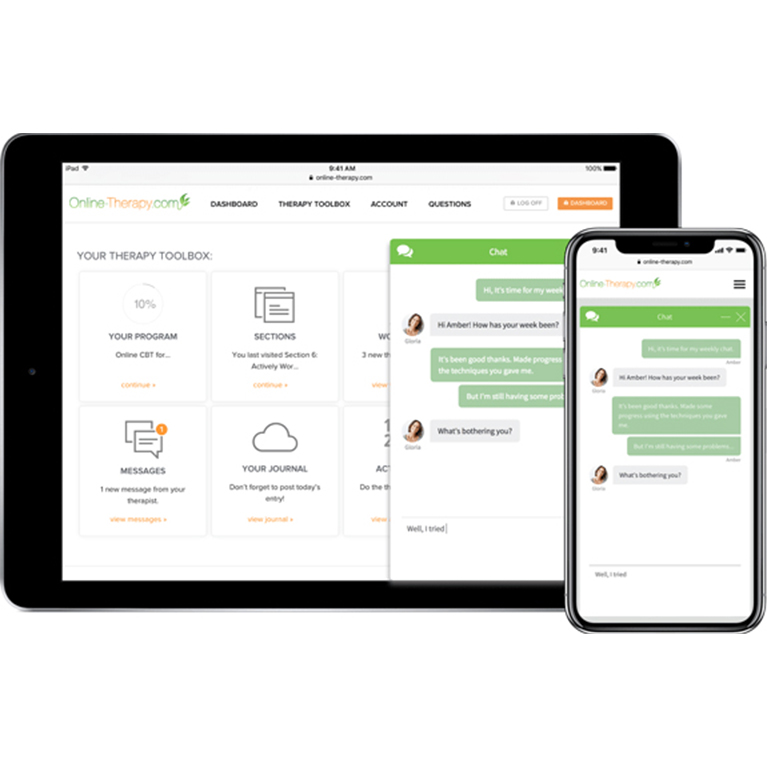
|

|

|

|
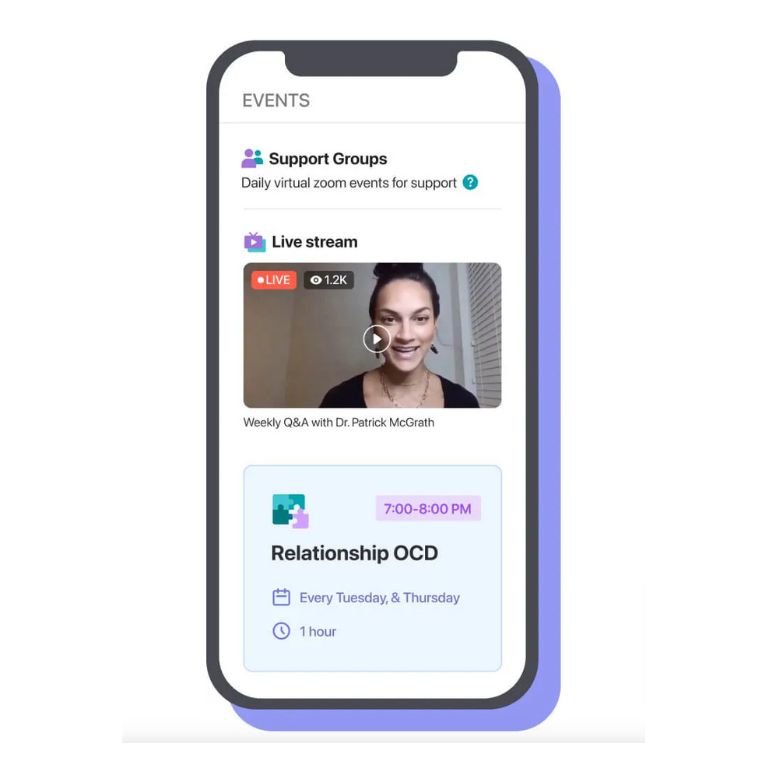
|
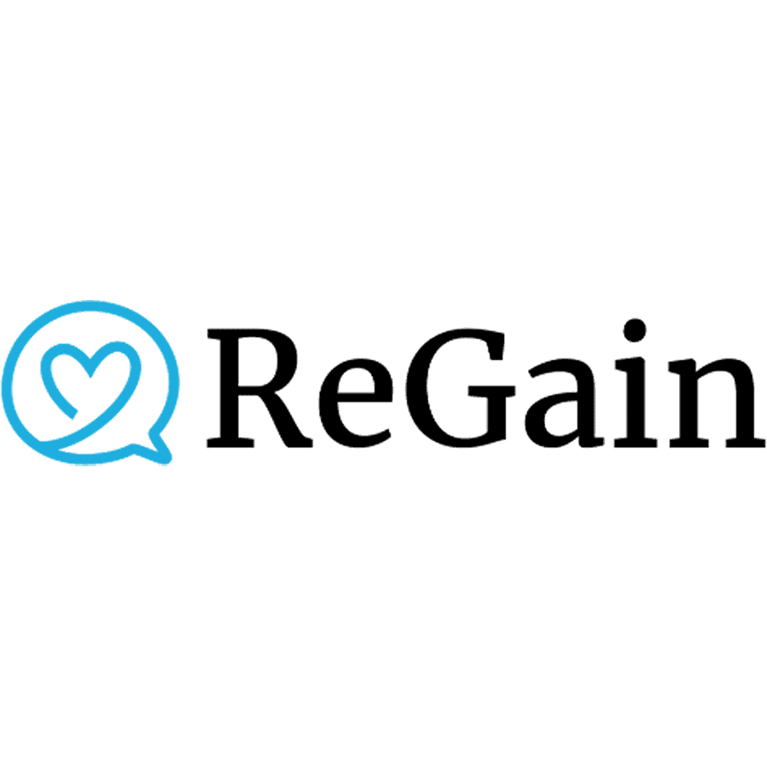
|
|
| BetterHelp | Online-Therapy.com | Brightside | Amwell | Thriveworks | NCOD | Regain | |
| Rating | |||||||
| Cost | $70-$100 per week | $40-$110 per week | $299+ per month | $99 or less session without insurance | $200+ per session for self-pay, varies for insurance | $110-$210 per session | $65-$90 per week |
| Session type | Individual, Couples, Teen | Individual, Couples | Individual | Individual, Couples, Children | Individual, Couples, Family, Teens, Children | Individual | Individual, Couples |
| Insurance Accepted | No | No | Yes | Yes | Yes | Yes | No |
Best overall online cognitive behavioral therapy: BetterHelp


Key product features
What you should know
BetterHelp is one of the largest online therapy platforms on our list, with more than 30,000 licensed therapists in its database. The platform makes finding a knowledgeable, accredited, and experienced therapist much more accessible. It also provides flexibility when meeting and communicating with your therapist, allowing you to remain anonymous, use unlimited messaging, and pick from various communication options.
- BetterHelp excels in offering CBT to its online patients and offers worksheets and other tools that can be used to complement therapy.
- Although BetterHelp doesn’t accept insurance or even Medicaid, it does offer financial assistance to those who qualify.
- With an expansive database of therapists, BetterHelp is an excellent option for those who live in remote areas with little access to therapy or those who haven’t found a quality therapist near them.
- Those who use BetterHelp’s therapy services also have access to free CBT group therapy, which can be a great way to bounce ideas off other people or to gather a different perspective on your situation.
Why we like BetterHelp as best overall
Because there are so many therapists trained in CBT, finding the right one for you can be challenging. This is why we love BetterHelp as the best overall for CBT. Not only does it have a vast database of licensed and accredited therapists, but it also has a solid screening program to ensure that those working with BetterHelp are qualified and experienced.
What’s more, if you don’t find a therapist you connect with the first time—or even the second or third—switching to a different one is a simple process. Just let their support team know, and they will switch you to a different therapist. You don’t have to let your current therapist know you’re switching, as they will be notified via the portal that you are going to get another person’s perspective. This is a welcomed feature for those who may experience anxiety in these types of situations.
If you decide that CBT is not right for you or want to try an offshoot of it, there are several other therapy types to choose from, including psychotherapy, dialectical behavior therapy (DBT), mindfulness-based cognitive therapy (MBCT), and more. You can also attend free group sessions—which are a great way to complement your treatment and continue improving your skills and thought processes throughout the week.
“CBT is an approach that requires a fair amount of motivation as you integrate new ways of thinking into your everyday life. During intense stages of depression, when motivation is low, approaches outside of CBT may be more helpful.”
Rychel Johnson, MS, LCPC, Fortune Recommends Mental Health Advisor
We also appreciate the flexibility and the number of communication options it offers when it comes to having a session with your therapist. You can communicate with them via phone, text, chat, or video. You can even remain anonymous if you want to, though when you’re filling out their form, you will need to use your real name or an identifying email.
BetterHelp does not accept insurance, which may be limiting for people who rely on a provider or Medicaid to cover their mental health needs. That said, it does offer financial assistance to those who qualify, and it accepts HSA/FSA for individual and teen therapy. We also are disappointed that, in some areas, its connectivity and scheduling can be glitchy. However, with such a vast network and significant area of service, there are bound to be some issues here and there.
What customers are saying
People who have used BetterHelp appreciate the knowledge and expertise of the therapists as well as the extra services they provide. Plus, if they do not match with a therapist immediately, switching to a new one is easy until you find the right fit. For instance, verified Trustpilot reviewer, Soo Y., notes that the quality of help she has received is top-notch.
“It did take me two therapists to find the right person, but that would be the case even if you found an in-person therapist. The fact that it’s online definitely did not mean the quality was low. I have been recommending it to all my friends.”
Soo Y., verified Trustpilot reviewer
Meanwhile, Nick, another verified Trustpilot reviewer, says he was matched with a therapist within 24 hours—an excellent feature for anyone needing immediate help. “I would recommend this to anyone seeking a therapy service [who] cannot wait the three weeks like I suffered through.”
But with such an extensive network of therapists, there are bound to be technical issues and glitches. This was the case for Andrew M., a verified Trustpilot reviewer who experienced several technical problems with the service. What’s more, he says when the system glitched before an appointment, there was no way for him to contact technical support.
Specs
| Price | $70 to $100 per week |
| Insurance accepted | No |
| Messaging | Yes |
| Companion app | Yes |
Best online cognitive behavioral therapy for anxiety: Online-Therapy.com
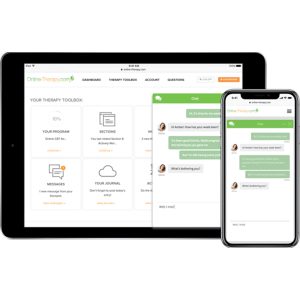

Key product features
What you should know
If you have anxiety, CBT is the treatment option with the most evidence of effectiveness (3), and Online-Therapy.com delivers on that and then some. It’s a directory service that connects you with a licensed therapist and also includes a lot of extra features to complement your therapy and teach you how to manage your anxious thoughts.
- This online therapy directory is also accessible, with unlimited messages and accountability features designed to keep you on task and moving forward. There’s even a yoga component that can be used to relax and destress.
- As one of the most affordable options on the list, Online-Therapy.com is just $50 per week for the basic program (unlimited messaging and therapy program without live sessions) or $80 a week if you add one live session a week, making it a doable option even though the platform doesn’t accept insurance.
- Online-Therapy.com also offers an anonymity option, which is great for those who find anonymity allows them to be more productive in therapy sessions.
- There is even a journaling option, which is ideal for those who want to take stock of their anxious thoughts and learn how to better manage intrusive situations.
Why we like Online-Therapy.com as best for anxiety
When it comes to choosing an online therapy for anxiety, we appreciate the comprehensiveness of Online-Therapy.com. It’s a directory service that puts you in contact with therapists—after signing up for the platform and answering some questions, it will match you with a therapist that suits your needs. You can change therapists at any time if you’re not connecting with the one you’re matched with.
We’re particularly impressed with Online-Therapy.com’s extensive collection of complementary tools tailored to help you manage and cope with your anxiety between therapy sessions. Of note is the activity planner available in the app, designed for goal-setting and scheduling activities that allow you to put your new skills to the test. It also serves as an accountability tool to help you stay on track with your therapy.
You can also use the journaling feature to record your thoughts and experiences and document what’s working for you and what you still find challenging. You can choose to share these thoughts with your therapist or not. That is up to you.
We also appreciate the “sections” (or lessons) that provide information about anxiety and include worksheets to help you process the data and make it more personal. There’s even a yoga option, which allows you to practice mindfulness—a key component in managing anxiety symptoms. (4)
Online-Therapy.com is particularly conducive to those with anxiety disorders. It offers unlimited messaging for extra support and allows you to be anonymous online—a great feature for those whose anxiety increases when they see their name on the screen. That said, your identity will be available to the therapist through the emergency contact portion of your profile. Through this, they can contact someone on your behalf should it be necessary.
Online-Therapy.com does not accept insurance. Though it’s one of the more affordable options, starting at $40 per week for unlimited messages and the therapy program ($64 a week if you add one live session a week) for those with full mental health benefits, using this therapy option may not make sense. Likewise, we wish it offered a trial period or a more flexible refund policy so people could check out the service without being locked into a membership. We also found that while all the extra features are beneficial in theory, for some people, this can be overwhelming and cause additional anxiety.
Read our full Online-therapy.com review for more information.
Specs
| Price | $50-$110 per week |
| Insurance accepted | No |
| Messaging | Yes, unlimited |
| Companion app | Yes |
Best online cognitive behavioral therapy for depression: Brightside


Key product features
What you should know
When you have depression, getting set up with a therapist in a timely manner is of the utmost importance, and this is where Brightside excels. Not only does it offer a free assessment, but it also can connect you with a therapist in as little as 24 hours. Brightside’s network of therapists covers all 50 states.
- Brightside is easily accessible and offers an “Anytime Messaging” option, which allows you to connect with your therapist when you need extra support. On weekdays, you can expect to receive a response within 24 hours.
- Even though this online therapy option is on the expensive side ($299 per month) for those who are uninsured, for those with coverage from a private insurer or Medicaid, it can be an affordable solution for treating depression.
- Brightside also offers ongoing assessment tools and educational videos that can deepen your therapy experience and provide you with the resources you need to address depression.
- There is a crisis program for those whose depression has caused them to contemplate or even attempt suicide. This program is specifically tailored to meet the needs of those at risk.
Why we like Brightside as best for depression
When it comes to online therapy for depression, getting treatment as soon as possible is of the utmost importance. Not only can this condition cause severe symptoms, but it also can get progressively worse and increase the risk of suicide if left unaddressed. (5) “If you have had depressive symptoms, such as lack of energy or persistent sadness more days than not, seeking treatment is essential,” Johnson says. For this reason, you need an online therapy platform that doesn’t waste time getting you connected to a therapist—and Brightside Health does a fantastic job filling this need.
“CBT can help people with depression break their issues into smaller, more manageable pieces. Because depression can make our concerns feel incredibly daunting or impossible to address, a modality like CBT is helpful for digesting issues and reframing a negative mindset.”
Rychel Johnson, MS, LCPC, Fortune Recommends Mental Health Advisor
Not only does Brightside offer a free initial assessment, but it also can connect users to a therapist in as little as 24 hours. And, if you’re in crisis—thinking about suicide or engaging in self-harm—it has a program to address that as well. Even after you begin therapy, if things take a turn for the worse, this resource is available to you. You also can call the Suicide Prevention Lifeline at 988 and speak with a counselor 24 hours a day.
We appreciate that you can message your therapist with their “Anytime Messaging” option if you have questions or need extra support. Your therapist will respond to you within 24 hours on weekdays. This easy access is important for people with depression because waiting long periods to talk to someone can exacerbate symptoms like hopelessness and loneliness.
The platform even provides quizzes, videos, and trackers to gauge how you’re doing and if adjustments are needed in your treatment. And, if your therapist decides you may benefit from prescription medication, they can refer you to someone who can prescribe antidepressants or other medications that may be needed.
Overall, this is a great online CBT program that can help those with depression reduce their negative thinking and change their behaviors. We just wish it was more affordable for those without insurance. We’re also discouraged by reports of billing issues and inconsistent customer service.
For more information, check out our full Brightside review.
What customers are saying
The majority of reviewers on Trustpilot have found Brightside effective and useful for online therapy. They note improvements in their thoughts and behaviors and credit these changes to the input and expertise of their therapists. James, a verified Trustpilot reviewer, notes that despite the first two weeks of his therapy being tough, he has improved dramatically.
“I was already going through a rough patch in life, but afterward, everything started to get better. I applied what I was learning in therapy and applied it to my life. I can say that I am doing a lot better six months down the road.”
James, verified Trustpilot reviewer
However, some users have needed help with the technology. For instance, Dan B., a verified Trustpilot reviewer, indicates that he feels like the technology has become a wall between him and his therapist.
Specs
| Price | $95-$349 per month |
| Insurance accepted | Yes |
| Messaging | Yes |
| Companion app | Yes |
Best online cognitive behavioral therapy for insurance: Amwell


Key product features
What you should know
If you’re looking for online therapy that takes insurance, Amwell’s platform may be just what you need. Not only does it accept most insurance providers, but it also has a robust group of licensed online therapists who can provide online CBT.
- Amwell doesn’t require upfront payment, nor does it require you to enter into a contract or a membership agreement, which makes starting and stopping therapy relatively seamless.
- While $100 or more per session is a little high, you may pay less if you have insurance. Instead, you may have a co-pay and/or owe a fee percentage.
- Amwell also offers therapy for children ages 10-17, which means busy parents can ensure their child gets the mental health support they need without requiring extensive travel or scheduling challenges.
- If you have depression, anxiety, or another mental health condition that requires medication, your therapist can recommend you to one of the physicians with Amwell, who can evaluate you and prescribe medication if it’s needed for your symptoms and situation.
Why we like Amwell as best for insurance
If you have insurance coverage that covers online mental health services, chances are high that Amwell accepts your insurance plan. In fact, it has the most extensive list of providers of any of our online therapy options. This fact makes it highly accessible for people looking for an online therapist who accepts their insurance.
We also appreciate that it doesn’t require you to pre-purchase therapy sessions, nor does it lock you into a membership agreement. Instead, you can work directly with a therapist who accepts your insurance, which takes a lot of the headache out of finding an online therapist.
Not only does it offer CBT for adults and couples, but it even provides therapy for children ages 10 to 17. This is a great feature for busy parents who don’t have to block out huge chunks of time to get their child the care they need. Instead, they can arrange a 45-minute therapy session in the privacy of their own home at a convenient time.
Some people have indicated that getting an evening or weekend appointment may be challenging. You may have to wait a few weeks after signing up before those time slots become available because they tend to book more quickly than daytime appointments. Additionally, the landing page can be tricky to navigate, as it is easy to accidentally schedule a healthcare visit rather than a therapy session.
We also wish Amwell offered messaging between therapy sessions. While you can message your therapist between sessions in the portal, there’s no guaranteed response time. So, this messaging capability cannot be used for extra support between sessions.
What customers are saying
Those who have reviewed Amwell on Trustpilot are most impressed with the level of therapy they’ve received from the platform. Not only do they appreciate the expertise and knowledge, but also the empathy and compassion it provides.
For instance, Quinn, a verified Trustpilot reviewer, notes that their experience has been a game changer.
“The care exceeds what I have received from any in-office psychiatrist over the years. I feel I am being listened to and that my case is being truly considered instead of having medications thrown at me in rapid sequence like darts at a dart board.”
Quinn, verified Trustpilot reviewer
And LW, another verified Trustpilot reviewer, echoes those sentiments. Not only are they impressed with their therapist, but they also note that her expertise exceeds expectations. “I look forward to our meetings and appreciate the quality and effectiveness of the homework assigned. She is well-versed in PTSD and depression. I am grateful to have found her.”
However, some Trustpilot reviewers, like Tara B., indicate continued issues with the billing system. In her case, the system fails to recognize that she has insurance and charges her as a self-paying client. She says she’s frustrated with the extra work she has had to put in to resolve the charges.
Specs
| Price | $100 and up per session |
| Insurance accepted | Yes |
| Messaging | No |
| Companion app | Yes |
Best online cognitive behavioral therapy for trauma: Thriveworks


Key product features
What you should know
If you’re looking for an online therapy option that provides CBT for trauma, look no further than Thriveworks. This online therapy platform includes over 2,200 clinicians who can treat people of almost any age, plus couples and families.
- Thriveworks offers flexible scheduling and ensures new patients have an appointment with a therapist in three to five days.
- Thriveworks tends to come in at a higher price point than other online therapy options for people who don’t have insurance coverage for mental health. Still, you’ll likely have better luck for those with insurance since the company is in-network with multiple providers.
- Those who want more than just a weekly therapy session will appreciate the number of extra features that Thriveworks provides. They can use the free eBooks and educational materials, get prescribed medication if needed, use the “Ask-a-Therapist” feature for questions, and participate in the fireside video courses.
Why we like Thriveworks as best for trauma
As many as 61% of American men and 51% of American women have reported exposure to at least one traumatic event in their lifetime. (6) Whether that’s a natural disaster, a fire, combat, sexual assault, or something else, trauma can leave a lasting imprint on a person and impact their mental health. “Seeking help for trauma is important, especially if you notice signs that it is taking over your everyday life,” says Johnson. “These signs can include a heightened emotional state or avoidance of certain people or situations.” Fortunately, resources like Thriveworks help people process and heal from trauma in their lives.
While Thriveworks offers a variety of therapy options, including CBT, what sets it apart in its approach to online therapy is the number of other tools and resources it provides. From eBooks and educational materials to the fireside video courses and the “Ask-a-Therapist” feature, there are a ton of free resources to supplement your therapy sessions. You can even get a prescription for medication from one of their authorized providers if you need it. Since Thriveworks providers are employed by the platform—as opposed to other platforms that simply direct you to local therapists—they can promise sessions within 3-5 days.
We also appreciate the quick scheduling process—most new patients are matched with a therapist in three to five days. Its commitment to treating people of all ages makes it an excellent option for children who need CBT for a trauma experience. Plus, Thriveworks is in-network with many insurance providers, so you can take advantage of the services at a reasonable price if you have coverage.
That said, Thriveworks can become very costly for uninsured or even underinsured people. But determining exactly how much you’ll pay takes work. Not only are prices not officially listed on its website, but its rates vary by state and region, so your out-of-pocket cost will depend on your location. Without insurance, though, therapy starts at $200 per session. We also wish it provided messaging, but the Ask-a-therapist feature somewhat fills this need.
Check out our full Thriveworks review for more information.
What customers are saying
Nearly everyone who has reviewed Thriveworks on Trustpilot has been pleased with the therapy and the level of care and concern expressed by the therapists. For instance, Zvon E., a verified Trustpilot reviewer, considers Thriveworks the best therapy experience they’ve had.
Jack S., another verified Trustpilot reviewer, notes that his therapist has been very professional and offered excellent guidance regarding the issues he was dealing with. His only problem is with the billing department, which has had several issues.
Specs
| Price | $200 and up |
| Insurance accepted | Yes |
| Messaging | No |
| Companion app | Yes |
Best online cognitive behavioral therapy for OCD: NOCD
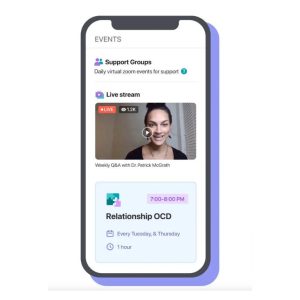

Key product features
What you should know
While it can be challenging to find therapists who will administer exposure and response prevention (ERP) therapy (a form of CBT), NOCD has reduced some of that burden by creating a platform with over 580 therapists who are licensed, trained, and experienced in treating OCD all in one spot. These clinicians are available 24/7 to help people with OCD learn new ways of interacting with the world around them.
- NOCD offers a variety of session lengths, self-guided tools, an online message board, and virtual support groups to help people customize their treatment.
- While this online therapy platform can be costly for those who are not insured, if you have insurance that covers mental health, it’s in-network with several providers.
- People with OCD often are reluctant to get therapy, (7) but NOCD simplifies the process and gives them the tools they need outside of therapy to learn how to manage their symptoms.
Why we like NOCD as best for OCD
Obsessive-compulsive disorder (OCD)—which impacts 2% to 3% of people in the U.S.— is a mental health condition characterized by obsessive thinking and compulsive actions that can interfere with everyday life. (8)
Despite how common this condition is, finding a therapist trained to meaningfully address it can be hard, especially if you have a particularly challenging subtype. But NOCD, an online therapy platform, has pooled many therapists skilled in treating OCD all in one place, making it easier for those seeking treatment to find someone to help them—regardless of which type of OCD they have. Plus, it has therapists licensed to treat a wide variety of ages, so whether you’re looking for therapy for yourself, your child, or someone else in your life, you’re likely to find a therapist on NOCD who can help you. NOCD’s therapists work through NOCD’s platform, so it’s not simply a directory of nearby therapists.
We also appreciate that it’s in-network with several insurance providers and supplements treatment with virtual support groups, online message boards, and self-guided tools you can use at home. This makes the therapy process much more thorough. It also offers exposure and response prevention (ERP), a type of CBT that’s considered the first line of treatment for OCD. This therapy involves gradually exposing people to situations that trigger their obsessions or fears while also teaching them to avoid the habitual responses they are used to. (9)
We wish the therapy was more affordable for people without insurance, though the company indicates that the prices are well below what ERP usually costs, which comes in at around $250 to $400. Additionally, requiring a membership agreement locks people into the service and doesn’t provide much flexibility in canceling should they decide it’s not right for them. But if you’re sure that you want to try ERP therapy, this may be one of the best options out there to do it online.
Specs
| Price | $110-$210 per session (without insurance) |
| Insurance accepted | Yes |
| Messaging | Yes |
| Companion app | Yes |
Best online cognitive behavioral therapy for couples: Regain


Key product features
What you should know
Regain offers CBT that can help couples improve communication, strengthen their bond, and learn how to resolve conflicts healthily. It also offers flexible therapy sessions where people can come individually or as couples. More importantly, the therapists provide the necessary tools to realign your relationship.
- Regain offers a safe and supportive setting where couples can work on addressing issues in their relationships and developing better communication skills.
- Although Regain doesn’t accept insurance, it offers therapy at a starting price of $65 per session, which is manageable for some people. Though you must pay in advance, it offers a hassle-free cancellation policy.
- Facilitated by licensed therapists, Regain strives to create an environment where couples feel heard and validated and learn how to make positive changes.
Why we like Regain as best for couples
CBT can help couples identify and change unhelpful thoughts, emotions, and behaviors that contribute to their relationship difficulties. It also equips them with the necessary skills to manage conflict, build emotional intimacy, and improve communication. We’re impressed with Regain’s approach to this process. Utilizing the skills of licensed and experienced therapists, it offers convenient relationship therapy to couples needing extra guidance.
New users are matched with a therapist within a few hours or a few days, depending on availability, though Regain says most users are matched within 48 hours. Matches are based on the type of issues you’re dealing with, your preferences, and what your goals are for therapy. And if your first therapist isn’t the right fit, you can be matched to a different one at any time.
The flexibility in accomplishing this task makes Regain stand out. For instance, you don’t have to attend the sessions together if one partner is more reluctant to participate in therapy. Therapists are more than happy to meet with individuals if that’s what is preferred. Together, you can work on addressing individual concerns that may contribute to your relationship issues—and later invite your partner if they’re up for it.
And, if you do decide to attend online couples counseling together, you don’t have to be in the same place as you would with traditional, in-person counseling. As long as you have a mobile device and internet access, you can join your therapy session from just about anywhere. This is an excellent option for couples traveling or working odd hours. Therapy sessions can be done on a schedule that meets both party’s needs, which can reduce any conflicts over availability.
We also appreciate that Regain offers unlimited messaging for couples who need extra support or have questions between sessions. And we like that you can cancel at any time just by clicking “cancel membership” in the portal if your circumstances change or you decide therapy isn’t working out for you.
That said, we do wish Regain didn’t charge people in advance. This approach can be limiting for people on a tight budget and make therapy less accessible. We also wish its prices were slightly lower for individuals—as it is now, you pay one fee whether you both come or not.
Check out our full Regain review for more information.
What customers are saying
Most Regain reviewers on Trustpiliot find the therapy effective and impactful when it comes to couples counseling. Not only do they notice improvements in their relationships, but in some cases, the therapy is so rewarding that they plan to use the service again.
Take verified Trustpilot reviewer Ber A. as an example. She says that their pre-wedding therapist went above and beyond for them. “He was attentive, skillful in his guidance, and helped us discover much about ourselves. We’ll be using Regain again and can’t recommend them enough.”
Meanwhile, Sarah CE, another Trustpilot reviewer, was also pleased with her couples’ therapist and noted that she has been helping them learn to communicate better as a neurodiverse couple since Sarah has both ADHD and high-functioning autism.
“She is very attentive and listens and observes our interactions without interrupting. This helped her pinpoint the underlying root cause of our conflicts that we only saw on surface levels. This might save our marriage, which is on the verge of divorce due to irreconcilable differences despite our love over 15 years.”
Sarah CE, verified Trustpilot reviewer
However, some Trustpilot reviewers note that the payment process is not initially apparent. “Once you sign up, you are paying from that point—not from when your first session is booked,” notes Rami, a verified reviewer. “You are also paying a weekly fee even though the therapist you have been matched with may not be available for weeks.”
Specs
| Price | $65-$90 per week |
| Insurance accepted | No |
| Messaging | Yes |
| Companion app | Yes |
How we test online cognitive behavioral therapy
Getting cognitive behavioral therapy, the gold standard for mental health treatment, has never been easier with the number of online therapy options available. But just selecting a therapy platform at random can be risky. Suppose your mental health condition is not treated appropriately by experienced professionals. In that case, your condition can worsen, increasing your risk of other health conditions, and, in extreme cases, can lead to self-harm and even death.
Because of this, we feel it’s essential to review online therapy services using extensive criteria to ensure we’re only recommending those with proven track records so that you can get the care you deserve. Read more about Fortune’s teletherapy testing methodology for more information about each feature we evaluate.
Therapist quality—30%
A top-notch teletherapy service should feel both personal and professional, not impersonal or generic. It should connect users with certified and experienced therapists, not unqualified individuals. Here’s what we look for:
- Expertise
- Personalization
- Interaction quality
Accessibility and convenience—30%
Teletherapy directly impacts an individual’s ability to seek, engage with, and benefit from mental health services. Whether it’s a scheduling issue, lack of transportation, or being physically unable to see a therapist in person, everyone’s situation is different. Teletherapy is here to help change that. With the convenience of teletherapy being a significant advantage, we evaluate:
- Ease of use
- Availability
- Platform reliability
Cost and value—20%
Unfortunately, mental health services are a financial privilege, especially for those who don’t have insurance that covers it. In an era where mental health care is more necessary, yet often more expensive than ever, assessing the cost-effectiveness of teletherapy services becomes not just relevant but essential.
Here’s what we factor into a teletherapy’s cost and value rating:
- Pricing transparency
- Insurance and coverage
- Value for money
Support and resources—10%
Good mental health habits don’t end after each session. It’s a constant task we must continue to practice. Access to additional support and resources is invaluable for clients seeking to deepen their understanding of mental health issues, learn additional coping strategies, or continue therapeutic work in between sessions. Beyond the therapy sessions, additional support can enhance the therapeutic experience.
Our factors in this rating include:
- Supplementary materials
- Customer support
- Aftercare
Privacy and security—10%
While teletherapy is an incredibly convenient way to seek mental health, it poses some risks. Maintaining client confidentiality and data security is paramount in teletherapy. As clients entrust teletherapy services with their mental health information, stories, and vulnerabilities, the responsibility of these platforms to protect such information is paramount.
Here’s what we’re looking for:
- Compliance with HIPAA and data protection laws
- Encryption and security measures
- Anonymity options
What is cognitive behavioral therapy?
Cognitive behavioral therapy (CBT)—which is sometimes called the gold standard in psychotherapy—is used to treat a wide variety of mental health conditions. Based on the idea that your thoughts and behaviors impact your emotional well-being and physical health, therapists use CBT to help you identify negative thinking and actions and replace them with healthier versions. While CBT won’t wholly remove every challenge or difficulty from your life, it will help you reframe your thoughts and change your behaviors to navigate life’s circumstances more productively. (10)
Check out our full guide on the types of therapy for more information.
Who should consider online cognitive behavioral therapy?
Nearly 58 million people in the U.S. live with a mental health condition, but less than half of them get treatment. (11) For many people, the cost and lack of accessibility are significant roadblocks. For other people, the idea of going somewhere new, sitting face-to-face with someone they don’t know, and talking openly about what’s going on in their lives is overwhelming.
Consequently, online cognitive behavioral therapy (CBT) may be a good option for people who want therapy but cannot overcome the obstacles of in-person therapy. Not only is CBT the gold standard in treatment for mental health conditions, but it’s also well-suited for online platforms because it’s action-oriented and requires minimal therapist intervention.
Online CBT also works well for people who travel a lot, those who have challenges leaving their homes, those on limited budgets, or even those who are worried about the social stigma of getting therapy and prefer privacy. (12) That said, online cognitive behavioral therapy is not suitable for everyone. People in a crisis, with severe psychiatric disorders, or those experiencing suicide ideation might have better outcomes by meeting face-to-face.
How to choose the best online cognitive behavioral therapy
Just like in-person therapy, finding the right online therapist may take some trial and error before you find someone who understands your challenges and can help you progress and improve your thoughts and actions. If you’re considering online cognitive behavioral therapy, here are some steps to make your search process more manageable.
- Ask for recommendations. Talk to your primary care provider, friends, and family and ask for recommendations on services they have used. This can provide valuable insight and help you know where to start.
- Check with your insurance company. Whether you call or check online, find out if online therapy is covered, how much it is covered, and how many sessions will be covered. Knowing this information upfront will help determine if a platform meets your needs.
- Research the platform. Check out its website, read reviews, and message with questions. You want to be sure the online therapy provider offers the features you wish and addresses the mental health conditions you want to treat.
- Determine the pricing structure. It’s important to know upfront how billing works, what you’ll be expected to pay, and when. Some companies bill you per session, and others bill you monthly. Make sure the pricing and payment guidelines fit within your budget.
- Make sure the therapists are actually licensed. Sometimes, online platforms use nurses, life coaches, or other professionals to provide services. If you’re planning to get cognitive behavioral therapy, you want to be sure the person working with you is trained and licensed to provide that type of therapy.
- Find out if the therapist is licensed in your state. A therapist must be licensed to practice in your state to provide counseling or therapy. With some online therapy providers, this may mean that only one or two therapists can treat you, which means your choices will be limited.
- Determine how easy it is to switch therapists. Sometimes, you just won’t mesh with the first therapist you meet with, and that’s okay. But make sure switching therapists is an easy process. You should also check that the platform has more than one therapist licensed in your state, because if the only therapist it offers doesn’t work out, you may not have any other options.
What to expect during an online cognitive behavioral therapy session
The first time you meet with the therapist, they will likely gather some background information and determine what you want to work on. Cognitive behavioral therapy can be used to treat a lot of different conditions, including anxiety, depression, panic disorder, OCD, eating disorders, and more, so having specific goals in mind can help.
Build pullquote: “As you anticipate your first CBT session, it’s normal to feel a little nervous. After all, you’re meeting with a new person and sharing what brought you to therapy in the first place, and some nerves are expected. To feel better prepared, arrive with a few notes about what you would like to share about yourself. Asking questions about how CBT can help you is encouraged, so don’t hesitate to bring questions and concerns to your session.”
Rychel Johnson, MS, LCPC, Fortune Recommends Mental Health Advisor
Once you’ve established your goals, the following sessions will focus on developing a plan to help you overcome negative thinking and replace your current actions and behaviors with healthier ones. Your session may begin with some discussion of your current mood and difficulties. Then, your therapist may review any homework they asked you to complete and discuss the progress you’re making or the setbacks you’ve experienced. Then, together, you’ll set goals and develop a plan to complete the work before the next session. (13)
Completing homework is a crucial part of cognitive behavioral therapy because it helps teach you new skills to manage and cope with your issues. It also allows you to practice what you’re learning. Remember that the homework is not meant to be overwhelming but instead is designed so that you can try out new behaviors, thought patterns, and coping mechanisms. If you ever find it to be too much, make sure you communicate that with your therapist. (13)
Your therapist may also use questionnaires and other assessments to help gauge whether the therapy is helping or having an impact. Not only can this information help you see the progress you’re making, but it’s also useful for your therapist to determine what’s working and what isn’t. Based on your answers, the therapist will know how to change your treatment plan or if they should keep it the same.
FAQs
What types of insurance cover online behavioral therapy?
Both private health insurance and those purchased through the Health Insurance Marketplace must cover mental health services and substance use disorder services under the Affordable Care Act. Under the Act, these services are considered essential health benefits. (14) Likewise, if you’re on Medicaid, it also must provide mental health services—though the extent of coverage may vary from state to state.
All Medicaid programs are required to adhere to MHPAE (or the Mental Health Parity and Addiction Equity Act). This Act prohibits health insurance providers from imposing barriers or limiting access to mental health or substance use disorder benefits that don’t apply to medical and surgical benefits. (15)
If you have Medicare, outpatient mental health services are covered under Part B, but the settings are limited to community centers, therapists’ offices, and hospitals. Online therapy is usually not covered at this point, and it would need to be paid for out of pocket if you have Medicare. (16)
Is online cognitive behavioral therapy effective?
While online cognitive behavioral therapy is still relatively new, initial research shows it can be as effective as in-person therapy. (17) It’s particularly effective when treating and managing conditions like depression, generalized anxiety disorder (GAD), social anxiety, panic disorders, phobias, addiction and substance use disorders, adjustment disorder, bipolar disorder, and OCD. It can even be effective in treating diabetes, especially since negative thoughts and behaviors can impact their glucose control. Plus, it tends to be cost-effective and easily accessible. (18)
Can I do online cognitive behavioral therapy by myself?
Self-directed cognitive behavioral therapy, or guided CBT, is a type of self-help therapy you complete at your own pace and in your own time. People usually use apps, books, and other self-help strategies to improve their mental health and address their challenges. While self-help therapy is not a replacement for psychotherapy, people with mild mental health conditions have seen positive results from this approach. It also can be used to complement their counseling sessions with their therapist. (19)
How long do online cognitive behavioral therapy sessions last?
Depending on the platform, most cognitive behavioral therapy sessions last between 40 and 50 minutes. As for how long you will be in therapy, this varies depending on the person. However, compared to traditional psychotherapy or psychoanalysis, cognitive behavioral therapy is considered a short-term treatment. Some people only need a few sessions to feel better, while others need several months. (20)
How much does online cognitive behavioral therapy cost?
The cost of online cognitive behavioral therapy varies significantly depending on whether or not you have insurance, the platform’s price, your location, and your therapist’s education level. However, online therapy is typically less expensive than in-person therapy. Overall, you can expect to pay between $50 on the low end and $200 on the high end for one online cognitive behavioral therapy session.
How is online cognitive behavioral therapy different from other types of therapy?
Unlike psychotherapy or psychoanalysis, cognitive behavioral therapy is focused on tackling the here and now rather than examining the past. While therapists trained in CBT might ask a few questions about your past, they focus more on finding solutions for the current problems you’re facing. Meanwhile, client-centered therapy, a type of humanistic therapy, rejects the idea that therapists are the authorities or should be giving guidance. Instead, they help clients change by emphasizing empathy, concern, and interest rather than using tools like CBT. It’s also important to note that some therapists don’t limit themselves to one specific type of therapy but instead use an integrative or holistic approach to tailor their treatment to their client’s needs. These therapists might use a combination of CBT, psychoanalysis, and client-centered therapy. (21)
Our experts
Rychel Johnson, M.S., LCPC
Rychel is a licensed clinical professional counselor in Kansas. She owns a private practice specializing in anxiety treatment and social skills development. Rychel also enjoys extensive road trips and spending time with her husband, daughter, and two cats.
Krista Manning
Krista Manning is an accomplished medical copy editor and fact-checker who stands out in the pharmaceutical, health, and wellness domains. With a meticulous eye for detail and a command of medical language, Krista ensures the accuracy and clarity of content. Beyond her professional expertise, Krista is an advocate for mental health awareness. Recognizing the crucial intersection of psychological and physical well-being, she actively contributes to projects that promote mental health awareness within the healthcare narrative. Krista’s commitment extends beyond the pages she edits, emphasizing the holistic nature of health communication.

Sherri M. Gordon, CLC
Fortune Recommends Health Writer
About Author
Sherri M. Gordon, CLC is a health writer, certified life coach, and author of more than 30 books for young readers. With more than 20 years of experience covering health and social issues, Sherri is well versed in health conditions, mental health concerns, sleep, aging, parenting, and more. Her work has been featured in Health, Parents, Verywell Health, Columbus Parent, Home Living, and more. She also has earned a Certificate of Completion from Ohio State’s Patient and Community Peer Review Academy, where she frequently serves as a community reviewer for grant requests for health research.
